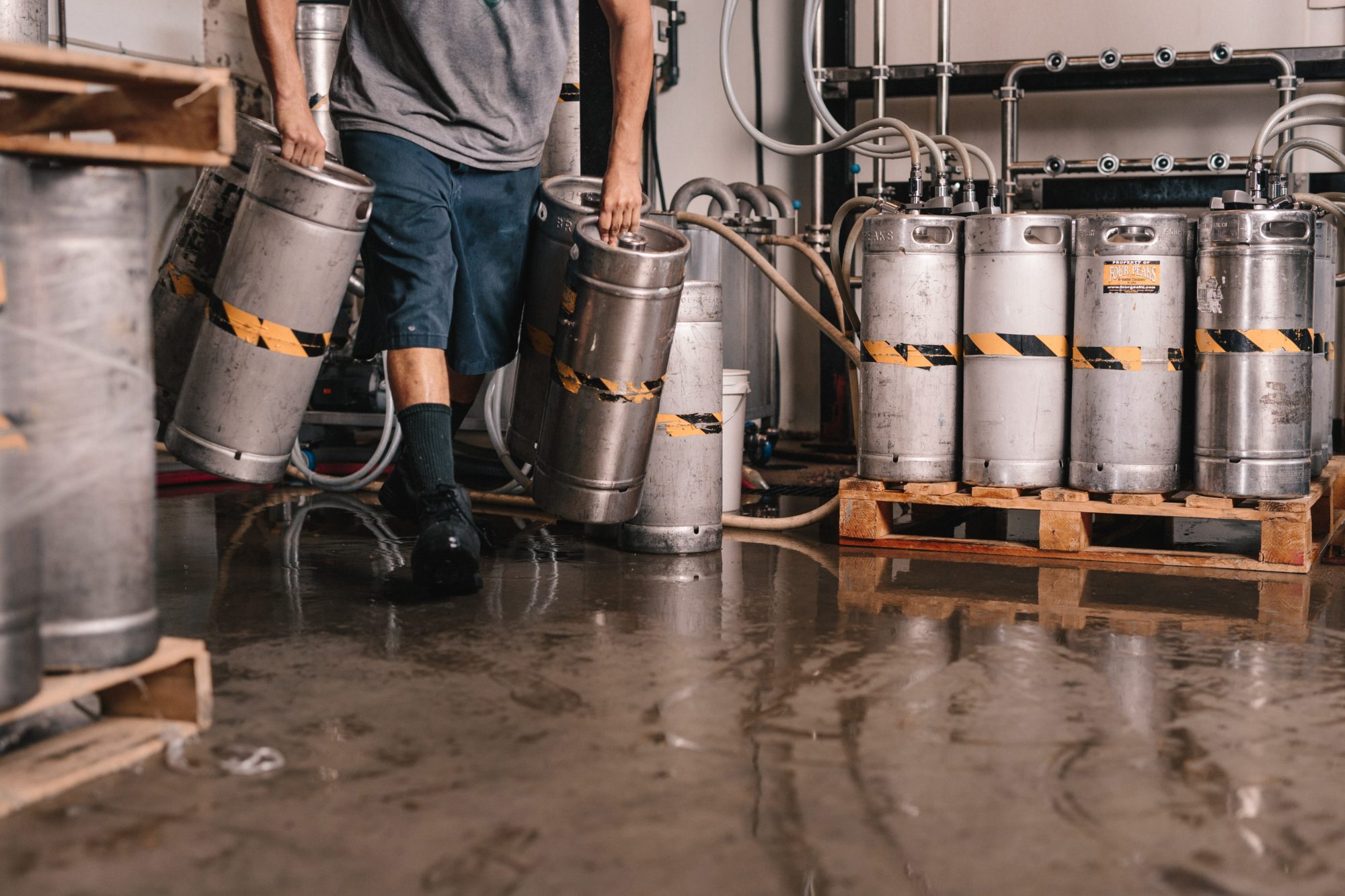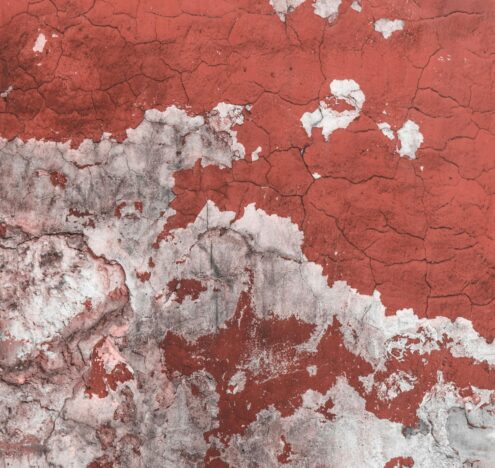The logo is unmistakable — three overlapping orbital spheres — but where the nucleus should be stands a beer bottle, the symbol of a small Dallas brewery called the Manhattan Project Beer Company that has ignited a firestorm across the Pacific for its nuclear weapons-themed beers.
In particular, a pink sour Gose-style beer called “Bikini Atoll,” has sparked ire in the Marshall Islands and beyond. Bikini Atoll and neighboring Enewetak Atoll, were the two primary Pacific Proving Grounds in the Marshall Islands where the United States tested 67 nuclear weapons between1946-1958, the equivalent of 1.6 Hiroshima-size explosions every day for twelve years.
Twenty-three of those tests were conducted at Bikini, rendering whole islands radioactive, leading to the forced evacuations of entire communities.
In addition to the initial blast exposure which caused nausea, vomiting, diarrhea, skin burns and hair loss, residents of Bikini, Enewetak and nearby atolls have had to be resettled repeatedly over not just decades, but generations, suffering food scarcity, hardship, and the loss of their ancestral homelands.
Radiation-related illnesses have included, but not limited to, elevated rates of thyroid, stomach, and colon cancer, leukemia as well as widespread incidents of stillborn births and severe birth defects including profoundly malformed “jellyfish” babies which frequently died hours or days after birth.
That an American company would capitalize on the symbol of so much pain and suffering is, for Marshallese and others, inexcusable.
That an American company would capitalize on the symbol of so much pain and suffering is, for Marshallese and others, inexcusable.
In a statement, the Marshall Islands government-appointed National Nuclear Commission (NNC) described “a great deal of outrage” to learn of a beer bearing the name of this symbol of US nuclear testing.
“For American consumers of Bikini Atoll beer who live far away from the radiation and devastation created… by the United States, the imagery on the can associated with the Bikini Atoll can be entertaining, interesting, or perhaps even funny,” the NNC statement said.
Those upset by the name, the statement continued, “know firsthand the devastation, injuries, and damages associated with US Government activities on Bikini Atoll.”
The NNC called on the Manhattan Project Beer Co. to increase its public education efforts, communicate directly with Bikini islanders, and consider profit-sharing and responses that recognize the rights of the Bikinian people.
[Read the full letter here.]Rhea Moss-Christian, NNC chair added, “To see a painful part of our history serve as entertainment for profit is very hard to swallow, but this is not the first time it’s happened and it’s unlikely to be the last. We are looking for ways to turn an otherwise unfortunate use of our history into something positive to support our justice efforts.”
As blistering criticism began to swell, the company released a statement on Twitter which read, “Our beer named Bikini Atoll was not created to mock or trivialize the nuclear testing that took place in the Marshall Islands. Through our brand and naming, we are creating awareness of the wider impacts and implications of the United States’ nuclear research programs and the pivotal moment in world history that is often forgotten…”
That statement notwithstanding, a review of the company’s social media platforms, website and blog offer little in the way of “creating awareness” of the devastation caused by nuclear weapons. The company did not respond to multiple requests for comment.
In a letter to the Manhattan Project Beer Company’s co-founder, owner and marketing strategist Misty Sanford, Marshall Islands Secretary of Health and Human Services Jack Niedenthal wrote, “your product makes fun of a horrific situation… This is unacceptable to us.”
Niedenthal, who has advocated on behalf of Bikinians for more than 30 years, has eulogized its elders upon their deaths, and whose wife, children and grandchildren are Bikini Islanders added, “On behalf of the people of the Marshall Islands, I highly encourage you to discard this ill-conceived product forever… and issue a public apology to our people.”
In a recent online interview, when asked what quality was essential to success, Sanford answered, “integrity” — it’s what sets the company apart from its competitors, she explained.
The Manhattan Project Beer Co. also stands apart for naming itself after the US Army Corps of Engineers’ Manhattan Project which was established to develop an atomic bomb during World War II. According to their website, the name came from the three founders “scientific and experimental” approach to brewing.
Misty, her husband Karl, and friend Jeremy Brodt have fully embraced the nuclear theme with drinks like a coconut porter called “Plutonium-239” (the fuel used in the bomb that killed and injured an estimated 140,000 in Nagasaki).
Other beer names include “Nuclear Winter” (an American stout), “Super Fortress” (an IPA named after the B-29s that dropped atomic bombs on Japan), and a pilsner called “Necessary Evil.”
A pale ale called “Little Boy” evokes images of Hiroshima’s destruction, “Half-life” IPA rings of radiation contamination, and “Hoppenheimer” (get it?) pays homage to the “father of the atomic bomb.”
In a blog post, the Manhattan Project Beer Co. announced, “our beer names are never arbitrary,” yet a deeper understanding of the profound impact of those names appears largely absent. In a 2018 podcast interview, when asked if he could tell listeners what Bikini Atoll was, co-found Karl Sanford replied deadpan, “no, I cannot.” After the interviewer explained, Sanford responded, “Oh, okay,” hastily adding, “I know about the original Manhattan Project though!”
Later in the interview, as Sanford struggled to explain who J. Robert Oppenheimer was, the interviewer asked, “Did you just look up a list of atomic terms?”
Sanford replied: “We were actually on a beer trip in San Diego and we were a couple beers in and said, ‘man, you know what would be a cool name for a brewery…’”
Sanford’s beer company is hardly the first commercial venture to embrace the image of America’s nuclear legacy. The most pervasive object is, of course, the two-piece women’s swimwear which uses the anglicized spelling of Pikinni Atoll, with countless other items and brands as unlikely as SpongeBob Square Pants.
“Cool names” aside, impacts of nuclear testing in the Marshalls continue to today. In a study published in July by the Proceedings of the National Academy of Sciences (PNAS), researchers reported radiation levels in some parts of Bikini today are higher than those at Chernobyl and Fukushima.
Nuclear historian Alex Wellerstein of the Stevens Institute of Technology points out there is an abundance of “atomic kitsch” dating back to the beginning of the nuclear age, but says it can be difficult to draw the line between acceptable kitsch and outright offensive.
“Naming a beer after a weapon that killed 100,000 people, almost all of them civilians… is pretty unpleasant,” Wellerstein says. He wonders how people would react to a series of beer names based on a September 11 theme.
Naming a beer after a scientific concept or a scientist (although “Oppenheimer was a martini man himself,” he notes) is passable, says Wellerstein. “I’d avoid naming [beer] after anything that actually killed people, though.”
And while the US hasn’t tested nuclear weapons in the Marshall Islands since it detonated 33 atomic bombs during the summer of 1958, it continues to use Kwajalein Atoll as a target for testing ballistic missiles, improving the US’s weapons capabilities, but also raising concerns about the environmental impact.
Meanwhile, the Manhattan Project Beer Co. hopes to expand and sell more nuclear weapons-themed beer. In a 2018 interview, Sanford said his company can produce 50 barrels in a “good month.”
In another blog post, the company stated, “The Best Writing Happens After a Beer.” Whether or not that extends to “the best ideas” is subject to debate.
Jon Letman is a Hawaii-based independent journalist covering people, politics, and the environment in the Asia-Pacific region.





















